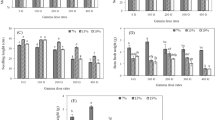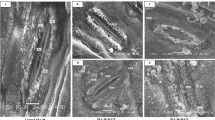Abstract
To investigate the effect of γ-ray irradiation on B chromosomes, dry seeds of a stock of Pennisetum typhoides carrying B chromosomes were exposed to γ-ray irradiation in doses of 10 kr., 20 kr. and 30 kr.; the γ-ray source was cobalt-60. The treated seeds were sown in pots and those that survived were transplanted into the field later. Meiosis in the pollen mother cells was examined to determine the types of aberration produced. For cytological investigation young spikelets were fixed in acetic alcohol (in proportions of 1 : 4) and anther squashes were made in acetocarmine.
This is a preview of subscription content, access via your institution
Access options
Subscribe to this journal
Receive 51 print issues and online access
$199.00 per year
only $3.90 per issue
Buy this article
- Purchase on Springer Link
- Instant access to full article PDF
Prices may be subject to local taxes which are calculated during checkout
Similar content being viewed by others
References
Krishnaswamy, N., and Rangaswamy Ayyangar, G. N., J. Ind. Bot. Soc., XX, 3, 111 (1941).
Caldecott, R. S., and Smith, L., Cytologia, 17, 24 (1952).
Author information
Authors and Affiliations
Rights and permissions
About this article
Cite this article
PANTULU, J. Chromosomal Alterations in Pearl Millet induced by γ-Rays. Nature 213, 101–102 (1967). https://doi.org/10.1038/213101a0
Issue Date:
DOI: https://doi.org/10.1038/213101a0
This article is cited by
-
Trisomic categories in pearl millet (Pennisetum americanum (L.) Leeke)
Theoretical and Applied Genetics (1988)
-
Tertiary trisomics of pearl millet (Pennisetum americanum (L.) K. Schum): its cytomorphology, fertility and transmission
Theoretical and Applied Genetics (1982)
-
Induction of segmental interchanges in pearl millet (Pennisetum typhides)
Theoretical and Applied Genetics (1979)
-
Tertiary trisomics in pearl millet (Pennisetum typhoides Stapf & Hubb)
Genetica (1978)
-
Meiosis in diploid and tetraploid desynaptics of pearl millet
Proceedings / Indian Academy of Sciences (1978)
Comments
By submitting a comment you agree to abide by our Terms and Community Guidelines. If you find something abusive or that does not comply with our terms or guidelines please flag it as inappropriate.



